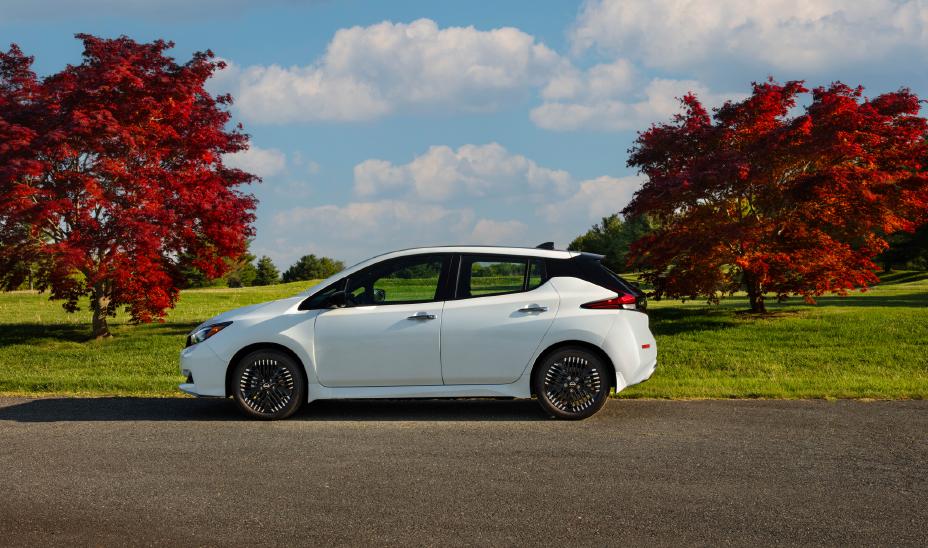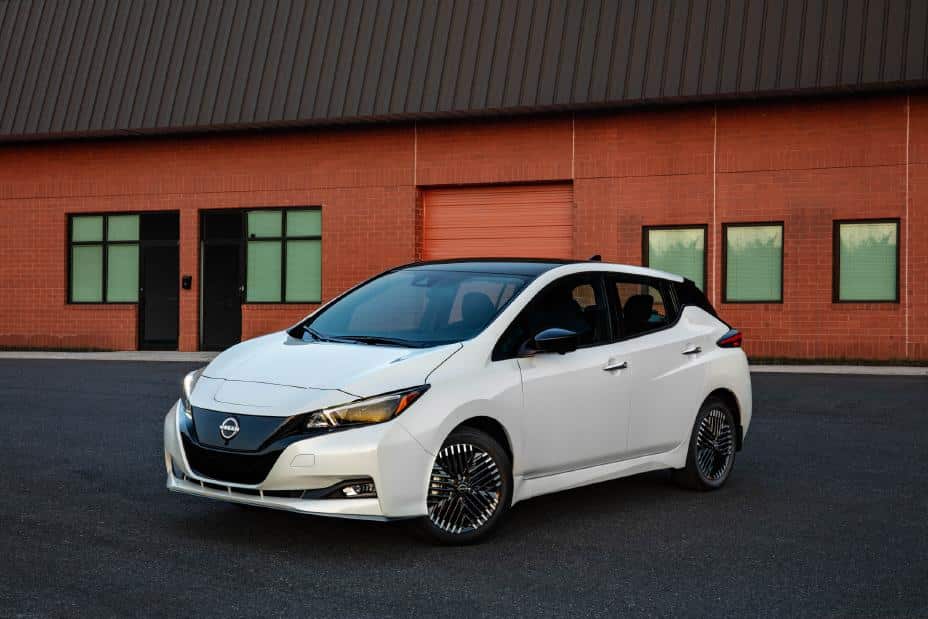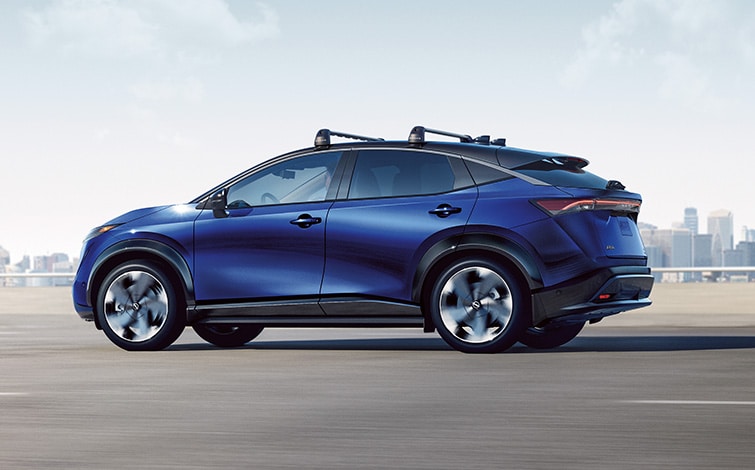Venerable Nissan Leaf U.S. Sales Up 187% In Q3, FE-20 Bidirectional Charger Approved
The Nissan Leaf, introduced 14 years ago as the world’s first mass-produced electric vehicle, continues to show surprising resilience in the market. Now in its second generation for seven years, this distinctive electric hatchback is still selling in significant numbers in the United States.
In the third quarter of 2024, Nissan sold 4,514 Leaf EVs in the U.S., marking an impressive 187.5% increase compared to the same period in 2023, when only 1,570 units were sold. While the Leaf’s Q3 2023 performance wasn’t particularly strong, what stands out is its continued popularity despite the emergence of more advanced models.

2025 Leaf Specs
The 2025 Nissan LEAF is now available for purchase, starting at a Manufacturer’s Suggested Retail Price (MSRP) of $28,140. This popular electric vehicle offers two battery options to cater to varying driving needs. The LEAF S comes equipped with a 40-kWh lithium-ion battery, providing an EPA-estimated range of up to 149 miles, while the SV PLUS features a 60-kWh battery, extending the range to 212 miles.
All 2025 Nissan LEAF models come standard with Nissan Safety Shield 360, a suite of advanced safety technologies that includes Automatic Emergency Braking with Pedestrian Detection, Blind Spot Warning, and Lane Departure Warning. For additional convenience, the LEAF SV PLUS is equipped with ProPILOT Assist and Intelligent Around View Monitor.
Nissan is also offering EV Carefree+ with the 2025 LEAF, designed to provide a stress-free ownership experience. This includes scheduled maintenance for three years or 36,000 miles, EV Battery Health Assurance, and 36 months/36,000 miles of emergency EV Roadside Assistance.
2024 Leaf Models are Eligible for Tax Credit, But 2025 Models Not Eligible
As of now, the 2025 Nissan LEAF is not eligible for the Federal EV tax credit under Internal Revenue Code Section 30D, based on final regulations released by the IRS on May 3, 2024. However, buyers may still qualify for up to $3,750 in potential federal EV tax credits on remaining new 2024 LEAF vehicles, provided they were manufactured in 2024 and are purchased and delivered to the customer before January 1, 2025.
It’s recommended that customers consult with their tax advisors to determine their specific eligibility for the credit and to maximize potential savings on their EV purchase.
CHAdeMO Chargers Can Be Hard to Find
The Leaf uses CHAdeMO, a fast-charging system designed for battery electric vehicles, developed in 2010 by the CHAdeMO Association, which was established by the Tokyo Electric Power Company and five major Japanese automakers. The name “CHAdeMO” is an abbreviation of “CHArge de MOve,” which the organization translates as “charge for moving.”
While CHAdeMO played a significant role in the early adoption of fast-charging technology, it is now considered outdated in the United States. Currently, the Nissan Leaf and the Mitsubishi Outlander PHEV are among the few models that still utilize this charging standard in the country. As the electric vehicle market evolves, newer charging standards such as NACS and CCS (Combined Charging System) have gained more traction, leaving CHAdeMO’s prevalence diminishing. This is a disadvantage of driving the Leaf and should be considered before purchase.

Fermata Energy’s FE-20 bidirectional charger and V2X Platform Approved for use with Nissan LEAF
In August 2024, Nissan approved the Fermata Energy FE-20 bidirectional charger for use with the Nissan LEAF, enhancing the LEAF’s position as the first mass-produced electric vehicle in the U.S. capable of supplying energy back to the grid. The FE-20 charger meets both UL and CHAdeMO standards, and passed Nissan’s requirements for compatibility with the LEAF. This technology allows the charger to either recharge the vehicle’s battery or send stored energy from the parked LEAF back to a building or the grid, potentially reducing electricity costs by offsetting peak demand.
A proof-of-concept trial at Nissan Americas Headquarters in Franklin, Tennessee, demonstrated the potential of Fermata’s technology when the earlier FE-15 bidirectional charger helped reduce electricity bills by over $9,450 in four years, or nearly $2,000 annually.
Building on the positive results of the FE-15 trial, the next-generation Fermata Energy FE-20 bidirectional charger and the updated Fermata Energy intelligent V2X software platform are expected to offer even greater success. The FE-20 will deliver 33% more power and is UL 1741-SA certified, ensuring it meets key safety and performance standards. It also supports IEEE 2030.5 for Common Smart Inverter Profile (CSIP) operation under California Rule 21.
The new design of the FE-20 is more optimized, allowing for faster and less expensive manufacturing, which is expected to reduce its retail cost, making the technology more accessible for Nissan dealers and fleet customers. These advancements will further improve the efficiency and affordability of Vehicle-to-Grid (V2G) technology.
Nissan Ariya Offers Price Cut Across all Trims, Enjoys 23.3% Q3 U.S. Sales Increase
Nissan’s other all-electric model, the 2024 Nissan Ariya, is now available for sale, with a starting Manufacturer’s Suggested Retail Price (MSRP) of $39,590. To appeal to a broader range of EV buyers, Nissan has reduced prices across all trim levels. The entry-level Ariya Engage model has seen a price cut of $3,600, while other trim levels have been reduced by as much as $6,000.

“As the electric vehicle market continues to develop and grow, the revised pricing for the 2024 Ariya will improve the model’s competitiveness and ensure we are delivering maximum value to our customers,” said Trisha Jung, senior director, EV Strategy and Transformation, Nissan U.S.
The 2024 Nissan Ariya offers two battery sizes, along with the choice between front-wheel drive and Nissan’s advanced, dual-motor e-4ORCE all-wheel drive. The streamlined lineup consists of five well-equipped grades, delivering an EPA-estimated driving range of up to 304 miles. Select trims also feature ProPILOT Assist 2.0, providing hands-off highway driving capability.
The Ariya comes with either a 63-kWh standard range battery (exclusive to the Ariya Engage) or an 87-kWh long range battery, with output ranging from 214 to 389 horsepower. The e-4ORCE all-wheel drive system enhances stability and driver confidence by continuously optimizing front and rear torque distribution and applying independent brake control at each wheel. This system not only improves handling but also reduces vehicle pitch and dive, offering a smoother, more comfortable ride. The Nissan Ariya uses two charging standards for its inlets, Type 2 and CCS.
The Ariya has received significant recognition, including being named to the Wards 10 Best Interiors & UX list for 2023 and earning the “Editor’s Pick” in Newsweek’s annual auto awards. Its e-4ORCE technology was recognized on Wards 10 Best Engines & Propulsion Systems list for 2023, and the Ariya also achieved the IIHS 2024 TOP SAFETY PICK designation.
Nissan Leaf History
The Nissan Leaf is a compact, battery-electric car that has been in production since 2010, spanning two generations. It has been offered exclusively as a 5-door hatchback and was unveiled on August 1, 2009, as the world’s first mass-market electric and zero-emission vehicle. Since its debut, the Leaf has earned numerous accolades, including the 2010 Green Car Vision Award, 2011 European Car of the Year, 2011 World Car of the Year, and the 2011–2012 Car of the Year Japan.
The second-generation Leaf was introduced in October 2017 and has seen improvements in driving range, which increased from 73 miles (117 km) to 226 miles (364 km) on a full charge, thanks to larger battery packs and other enhancements. By February 2022, global sales across both generations had reached 577,000 units. As of September 2021, European sales had exceeded 208,000 units, while U.S. and Japanese sales stood at over 165,000 and 157,000 units, respectively, by the end of 2021.
The Nissan Leaf held the title of the world’s all-time top-selling plug-in electric car until it was surpassed in early 2020.

Electric Vehicle Marketing Consultant, Writer and Editor. Publisher EVinfo.net.
Services